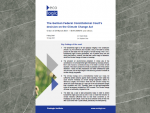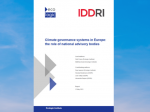Ecologic Institute Newsletter No 224 – May 2021
The German Climate Change Act does not sufficiently protect the future fundamental rights of those alive today
- Ecologic Institute Newsletter

The German Climate Change Act does not sufficiently protect the future fundamental rights of those alive today
Dear Readers,
It is rare to see decisions that cause such a legal and political stir as the ruling of the Federal Constitutional Court on the German Climate Protection Act (KSG). Climate activists are thrilled; the government is under pressure. But what does the decision actually say? If you don't want to wade through the more than 100 pages of the decision, you can find our Policy Brief in this newsletter, which summarizes the key contents. Let me highlight, however, that according to the Court, the state must actively protect life and health from the dangers of climate change. Even if the legislature has considerable leeway, the judges regard a timely transition to climate neutrality to be a necessity. A simple shift of emission reduction burdens into the future – along with the resulting restrictions on freedoms – is unconstitutional. So far so new.
As a result, the court classified parts of the current KSG as unconstitutional. In response, the German government presented a new KSG draft at the speed of light – with higher targets for 2030, a target for 2040, earlier climate neutrality and concrete reduction pathways.
The decision of the court just before the federal elections puts climate change into the spotlight of the political debate in Germany once again. This is a good thing, considering that the global community is still lagging behind the climate protection targets defined in the Paris Agreement. The climate summit in Glasgow in November will be an important benchmark for determining whether more resolute action is being taken in response to the growing challenge. A more ambitious and consistent climate policy in Germany can be an important contribution in this context. However, Germany's ability to position itself convincingly both within the EU and in Glasgow also depends on whether targets and figures are backed up with effective measures.
Ecologic Institute aims to contribute to this positive momentum with relevant research and critical analysis - be it with regard to developments in international law, national long-term strategies or very concrete local implementation measures. You can read more about this for example in the current newsletter. I hope you find it an inspiring read.
Dr. Camilla Bausch
Director, Ecologic Institute
The German Federal Constitutional Court's Decision on the Climate Change Act – Policy Brief
In a decision published in May 2021, the German Constitutional Court held that the Federal Climate Change Act is partly unconstitutional and has to be amended by the end of 2022. This policy brief explains the court's key arguments and findings and is available for download.
Climate Governance Systems in Europe: the role of national advisory bodies – Report
This report by Ecologic Institute and IDDRI provides a comprehensive mapping of climate advisory bodies in European countries and the national governance systems in which they operate. It proposes a typology to account for the diversity of advisory bodies and a three-tiered frame by which to evaluate national climate policy-making systems. The research was based on an in-depth investigation of national policy documents and structured interviews with country experts. The report is available for download.
It's Time to Put Climate Targets First – Article
Legally binding reduction targets for Member States should be the unequivocal starting point of making EU laws fit for new EU climate targets. Based on a new distribution formula, national targets should continue until climate neutrality is achieved in 2050, Dr. Nils Meyer-Ohlendorf writes in Euractive. The article is available online.
Conference on the Future of Europe – Article
The Conference on the Future of Europe begins on 9 May 2021. This political process can become a milestone in EU climate policymaking – provided that its recommendations are specific and focus on the EU's ability to act, Dr. Nils Meyer-Ohlendorf writes in the Tagesspiegel. He makes three proposals how the conference can support EU climate policies. The article is available online.
Using Nature-Based Solutions to Foster Synergies between Biodiversity and Climate – Event
Protecting and restoring nature is also recognised as being key to achieving both biodiversity and climate objectives, while delivering important socioeconomic benefits. A virtual breakfast briefing was held on 18 May 2021 with around 140 participants to discuss these topics and launch the Think2030 paper "Using nature-based solutions to foster synergies between biodiversity and climate: Missed chances and opportunities for a sustainable future", co-written by the Institute for European Environmental Policy (IEEP) and Ecologic Institute.
Heading to Carbon Neutrality – Panel Discussion
What are the key ingredients of a "Sustainable Recovery for a Green Future?" This was the topic of two events organized by Think20 (T20) during the Italian G20 presidency. Dr. Camilla Bausch, co-chair of the T20 Task Force on environmental issues, spoke on carbon neutrality, long-term climate strategies, and the European Green Deal.
The EU on the Road to the Glasgow Climate Summit (COP26) – Presentation
Many consider the Climate Summit in Glasgow, which will take place end of 2021, the most important summit since the adoption of the Paris Agreement in 2015. Upon invitation by the Andrássy University Budapest and the Friedrich Ebert Foundation, Dr. Camilla Bausch discussed recent developments in climate policy in the lead-up to COP26. Ada Ámon, Chief Climate Advisor to the Mayor of Budapest, and Prof. Dr. Dr. Heinrich Kreft of Andássy University, joined Dr. Bausch in a lively discussion of challenges and opportunities for the European Union on the road to Glasgow. The presentation slides are available for download.
What Role do Tenants Play in the Energy Transition in Berlin? – Event
On 30 April 2021, the research network Ecornet Berlin presented how tenants can benefit from the energy transition at the online Berliner ENERGIETAGE. Ambitious standards for energy-efficient refurbishment offer financial advantages for tenants if building owners take advantage of available subsidies. In particular, low-income households, which are often vulnerable to energy poverty, benefit when energy costs fall and rents remain stable. The event was organised by the Institute for Ecological Economy Research, the Ecologic Institute and the Öko-Institut within the research network Ecornet Berlin.
Improved Disclosure of Subsidised Renewable Energy Quantities and General Electricity Disclosure in Germany – Report
As part of a project to structure the energy law, Ecologic Institute contributed to concluding recommendations on the "Improved disclosure of subsidised renewable energy quantities and general electricity disclosure in Germany". The recommendations include general recommendations for the further development of accounting instruments of electricity disclosure, measures to improve the disclosure of supported electricity from renewable sources, additional measures on the format and content of electricity disclosure, and monitoring. The recommendations are available for download.
Circular Economy Approaches in the Field of Construction – Study
This study by Ecologic Institute examines different approaches and business models in the practices of lifecycle design, service life extension, use intensification and material re-use by means of literature analysis and supplementary interviews. Different, existing approaches and business models of different actors in Berlin are presented and barriers that hinder a transformation towards circular construction are identified. Development perspectives for circular construction in Berlin are then given based on an analysis of relevant governance components. The study is available for download.
Circular City Berlin – pathways from potential to implementation – Study
An evaluation of various databases and platforms shows that a diverse innovation landscape and a testbed for a Circular Economy has emerged in Berlin. The innovation ecosystem is based on the interaction of a multitude of actors and environmental conditions and focuses on new product utilisation systems. It is shaped by political and legal framework conditions, incentive structures and funding measures. The study, to which Dr. Martin Hirschnitz-Garbers of Ecologic Institute contributed, is available for download.
Resource Conservation Policy in the EU – Report
Decoupling economic growth and resource use is a core objective of the "European Green Deal". How this is to be achieved is formulated in the new "Action Plan for the Circular Economy" and the "Industrial Strategy" of 2020. Ecologic Institute's Susanne Langsdorf presents the key political documents of European resource policy and traces lines of development. The report is available for download.
Management of Groundwater Rights in France, California, and Spain – Article
How can the overexploitation of groundwater resources by irrigated agriculture be better managed? Dr. Josselin Rouillard together with colleagues from California, Spain and France, addresses this question in a new scientific article published in Water Resources Research. The research focused on how users and public authorities can work collaboratively and adopt collective rules to regulate access to and use of groundwater in agriculture.
Effectively Using Synergies between Health-Promoting and Environmentally Friendly Nutrition – Presentation
The 2021 annual conference of German Association of Dietitians has put a focus on sustainability and its relevance for the work for dietitians as well as policy makers. Stephanie Wunder gave an impulse presentation on this topic entitled "Effectively using synergies between health-promoting and environmentally friendly nutrition".
Nature-Based Solutions and Sustainable Urban Planning in the European Environmental Policy Framework – Article
This article, which is co-authored by Sandra Naumann and McKenna Davis from the Ecologic Institute, provides an overview of the state of the art of the environmental European policy framework and the recognized role of nature-based solutions (NBS) and sustainable urban planning (SUP) in reaching defined objectives and outlines insights on where NBS and SUP could play a larger role within this framework. Finally, it derives recommendations for a better integration of such concepts into the current framework. The article is available for download.
Crowdfunding for a Young Aspiring Scientist Working on Health & Climate
Ecologic Institute has launched its first crowdfunding campaign. We aim to bring a young, aspiring scientist to work with us in Berlin on the pressing issues of climate & health. We would be delighted if you were to support our crowdfunding campaign on the occasion of our 25th anniversary. The Stiftung Mercator has generously offered to match every Euro you donate – so each Euro counts double.
Every Action Counts: Let's Make Europe Blue
The Make Europe Blue campaign is calling on you – citizens, businesses, organisations, authorities, celebrities, educators – to make a pledge to help the ocean. Your pledge is a personal promise or action that will keep our ocean healthy. Every action brings change to our ocean. Get on board now!
Contents
- Climate Change
- The German Federal Constitutional Court's Decision on the Climate Change Act – Policy Brief
- Climate Governance Systems in Europe: the role of national advisory bodies – Report
- It's Time to Put Climate Targets First – Article
- Conference on the Future of Europe – Article
- Using Nature-Based Solutions to Foster Synergies between Biodiversity and Climate – Event
- Heading to Carbon Neutrality – Panel Discussion
- The EU on the Road to the Glasgow Climate Summit (COP26) – Presentation
- Energy and Circular Economy
- What Role do Tenants Play in the Energy Transition in Berlin? – Event
- Improved Disclosure of Subsidised Renewable Energy Quantities and General Electricity Disclosure in Germany – Report
- Circular Economy Approaches in the Field of Construction – Study
- Circular City Berlin – pathways from potential to implementation – Study
- Resource Conservation Policy in the EU – Report
- Water | Food | NBS
- Management of Groundwater Rights in France, California, and Spain – Article
- Effectively Using Synergies between Health-Promoting and Environmentally Friendly Nutrition – Presentation
- Nature-Based Solutions and Sustainable Urban Planning in the European Environmental Policy Framework – Article
- News
- Crowdfunding for a Young Aspiring Scientist Working on Health & Climate
- Every Action Counts: Let's Make Europe Blue


